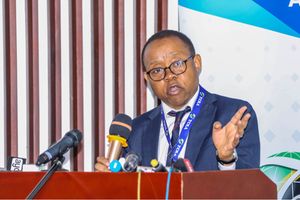Key findings by the Public Accounts Committee report

Members of Parliament applaud Public Accounts Committee (PAC) members as they present the report on the IPTL escrow account at Bunge in Dodoma yesterday. PHOTO | EMMANUEL SONGA
What you need to know:
PAC also found that Piper Links, the company that allegedly sold its 70 per cent IPTL shares to PAP was actualyy a ghost firm. “It is not known, not only in the British Virgin Islands, but anywhere else in the world,” PAC noted.
Dar es Salaam. Here are some of the major findings of parliamentary Public Accounts Committee (PAC) tabled in the National Assembly yesterday.
PAP did not formally acquire seven IPTL shares from Mechmar and therefore does not legally own the company as it claimed when it demanded the release of escrow money.
The share certificates were found to be held by Standard Chartered Hong Kong. PAC quoted a ruling by the High Court in the British Virgin Islands that handed the certificate to the representative of the bank:
“This is to certify that the Share Certificate No. 01 with 07 shares as defined in the Statement of Claim being held in Custody by The Court in the above matter be returned to Maples and Calder on behalf of the Claimant.”
Since the transfer of shares completes after the seller submits the share certificates to the buyer, PAC concluded that because IPTL failed to produce the same, the company therefore, if anything, bought “vapour” with which it used to claim and get escrow money.
PAC also found that Piper Links, the company that allegedly sold its 70 per cent IPTL shares to PAP was actualyy a ghost firm. “It is not known, not only in the British Virgin Islands, but anywhere else in the world,” PAC noted.
“PAC cannot understand why big institutions with good number of distinguished experts such as the Bank of Tanzania, ministry of Energy and Minerals, ministry of Finance, the Attorney General’s office and other arms of the State that took part in this matter failed to conduct due diligence,” the report reads.
A lot of revenue was lost in the irregular dealings. For instance, in the transfer of 70 per cent shares from Mechmar to Piper Links, the actual cost of shares was $6 million but the figures presented to TRA showed that the shares were sold at Sh6 million and the taxman lost Sh2 billion in revenue in this transaction alone, according to PAC.
Also, the same shares were sold at $20 million from Piper Links to PAP but TRA was informed that it was just $300,000 leading to a loss of Sh6.6 billion in uncollected revenue. In 1995, Tanesco and IPTL entered a 20-year Power Purchasing Agreement (PPA) although the initial Memorandum of Understanding (MoU) showed that it was supposed to be a 15-year contract.
All along the parties in the contract—Tanesco and IPTL—did not establish Operations Committee as per section 8.3 (a) of PPA. The parties were supposed to appoint the six-man body 180 days before the commercial operation date.
On April 1, 2004 Tanesco was informed by one of IPTL shareholders namely VIP Engineering that the state-owned firm was being overcharged capacity charges by IPTL and that led to the misunderstanding that led to the opening of Tegeta Escrow account at the Bank of Tanzania (BoT). Tanesco appointed Mkono Advocates which reported that capacity charges were calculated by IPTL based on $38.16 million Owners’ Equity.
instead of Sh50,000 that IPTL registered with Brela as paid up share capital.
Deputy CAG, Tanzania Revenue Authority (TRA) and Prevention and Combating of Corruption (PCCB) chief all told PAC that either part or all the money in the Tegeta Ecrow account belonged to the public. Therefore, energy and minerals minister Prof Sospeter Mhongo and his deputy Mr Stephen Masele, and the Attorney General Frederick Werema all lied to the parliament and the nation when they said that the money belonged to the IPTL shareholders alone.
The high court ruling in the case number 49 of 2002 and 254 of 2003 did not direct that the money in the escrow account be transferred contrary to agreements that led to its opening in the first place. Those who argued based on the case misinterpreted the ruling.




